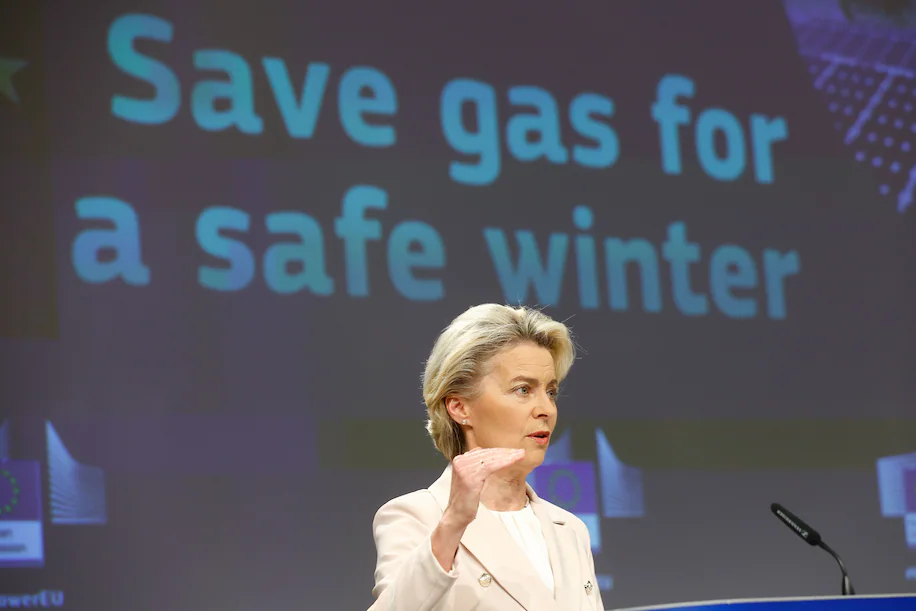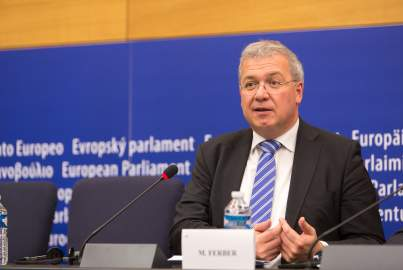Europe's solidarity crumbles in dispute over gas emergency plan
The EU wants to oblige its members to save 15 per cent gas - and to share it with each other in an emergency. The message: everyone is in the same boat. However, resistance is forming in many EU countries.
Resistance is growing in the EU
against the EU Commission's plans for a gas emergency plan. A number of countries are resisting above all
the Commission's plan to make the initially voluntary reduction of gas
consumption by 15 percent by March 2023 mandatory, if and when necessary.
The background to this is fear
that Moscow could further reduce or completely stop deliveries through the Nord
Stream 1 pipeline - this would primarily affect countries that are particularly
dependent on Russian gas, such as Germany.
Now the EU is stepping up the
pace. It is important to act now and not
wait until Putin turns off the gas tap, warns Ursula von der Leyen. The Commission President demands that all 27
member states contribute to saving as well as storing gas and that they are
also prepared to share gas with their neighbours if necessary.
Resistance from Southern Europe…
Resistance immediately came from
the Iberian Peninsula. Portugal's Energy Minister, João Galamba, spoke of an unacceptable proposal because it would
hamper electricity generation by gas-fired power plants while the country is
currently struggling with an extreme drought.
The Spanish Government would not
tell consumers to limit their gas consumption either, said Teresa Ribera, the Energy
Minister there. After all, she said,
Spain had been investing in a high-performance grid for years, even with the
fees paid by companies and private households, in order to be less dependent on
gas. "We do not want to have
anything imposed on us on which we were not even consulted beforehand and which
would have serious consequences for us," said Ribera.
Spain - unlike other countries -
has not lived "energetically" beyond its means, he said. "And no matter what happens, Spanish
families will not suffer gas cuts, and in the same way we will protect Spanish
industry."
...and Eastern Europe
Meanwhile, the Commission's
proposal is also opposed by other countries such as Greece, Hungary, Cyprus and
Poland, where Germany, in particular, is blamed for Europe's economy being
dependent on Russian gas.
They have little desire to help
the Germans out with gas, says Radosław Fogiel, spokesman for the ruling PiS
party, on Polish television: "We do not want to refuse at all. This is because the whole of Europe is in a
difficult situation. But we can remember
who was right and who was wrong. Germany
is now drinking the beer it served itself with," says Fogiel.
For years, he says, Germany built up its economic position with the help of Russian raw materials. "What happened in Chechnya or Georgia did not bother the Germans. That they are now in this situation has a certain irony."
Germany calls for solidarity
Germany, on the other hand, now
needs the solidarity of the EU, says CSU MEP Markus Ferber. Moreover, of course, says the Economic Policy Spokesman
for the Christian Democratic EPP, the largest group in the EU Parliament, the
danger that the gas pipelines could serve as political leverage for Moscow had
been underestimated.
"On the other hand, Germany
has shown great solidarity in recent years with regard to gas supplies to Central
and Eastern Europe. When we see today
that Poland has already completely filled its gas storage facilities, then
solidarity in the other direction must also work for a change."
From the Commission's point of
view, everyone is in the same boat
EU Energy Commissioner, Kadri
Simson warns: "Through the common internal market, all EU states will feel
the consequences if countries such as Germany have to close plants and supply
chains are severely disrupted.
Of course, the conditions in the
states are very different. Some - like
Belgium - are hardly dependent on Russian gas or, like Finland, have already
significantly reduced their consumption in recent years: "But solidarity
is very important when it comes to our energy security.
Simson: Only five per cent saved
so far
On Tuesday, the EU energy
ministers want to discuss gas supply at a special meeting. "I know my dear colleagues will outline
what their countries have already done. However, the EU-wide savings currently
correspond to only five percent and that is clearly not enough," says
Simson.
Whether at least 15 countries
representing 65 percent of the EU population will vote in favour of the EU
regulation at the meeting of energy ministers is an open question. However, countries that refuse will not be
able to count on the solidarity of the others in the event of an acute
emergency.







Comments
Post a Comment